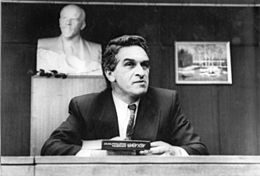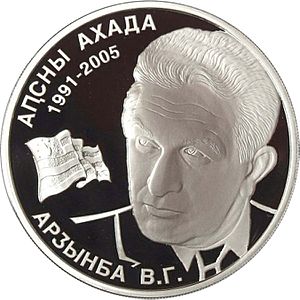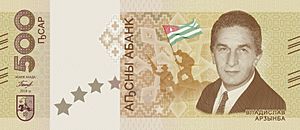Vladislav Ardzinba facts for kids
Quick facts for kids
Vladislav Ardzinba
Владислав Арӡынба |
|
|---|---|

Vladislav Ardzinba in Moscow in 1996
|
|
| 1st President of Abkhazia | |
| In office 26 November 1994 – 12 February 2005 |
|
| Vice President | Valery Arshba |
| Succeeded by | Sergei Bagapsh |
| First Secretary of the Communist Party of Abkhazia | |
| In office 8 November 1990 – 27 December 1991 |
|
| Chairman of the Supreme Soviet of Abkhazia | |
| In office 1990–1994 |
|
| Deputy of the Supreme Soviet | |
| In office 1987–1989 |
|
| Personal details | |
| Born | 14 May 1945 Lower Eshera, Sukhumi District, Abkhazian ASSR, Georgian SSR, USSR |
| Died | 4 March 2010 (aged 64) Moscow, Russia |
| Nationality | Abkhaz |
| Political party | Apsny |
| Spouse | Svetlana Jergenia |
| Signature | |
Vladislav Ardzinba (Abkhaz: Владислав Арӡынба, Georgian: ვლადისლავ არძინბა; 14 May 1945 – 4 March 2010) was the first leader of Abkhazia. He became its first President. Abkhazia is a region that declared itself independent from Georgia.
Ardzinba was a historian. He helped Abkhazia gain its independence in the 1992–1993 War with Georgia. However, most countries did not officially recognize Abkhazia as a separate country during his time as President. He served two terms from 1994 to 2005.
He was an expert in Hittitology, which is the study of an ancient civilization called the Hittites. In 1989, he was elected to the first parliament in the Soviet Union that was chosen by the people.
Contents
Early Life and Studies
Vladislav Ardzinba was born in a village called Lower Eshera. This village is in the Sukhumi District of what was then the Soviet Union. He went to the Sukhumi Pedagogical Institute. After that, he studied at the Tbilisi State University. There, he earned a special degree for his research.
He then spent 18 years working in Moscow. He focused on ancient civilizations from the Middle East. His boss was Yevgeny Primakov, who later became a top Russian official.
In 1987, Ardzinba returned to Sukhumi. He became the director of the Abkhazian Institute of Language, Literature and History. In 1989, people from Gudauta elected him to the Supreme Soviet of the Soviet Union. This was like being a representative in the Soviet parliament. He became very involved in issues about different regions, including Abkhazia. He quickly became a strong supporter of Abkhazia becoming separate.
Role in the Georgian-Abkhaz Conflict
Vladislav Ardzinba was chosen as the Chairman of the Supreme Soviet of Abkhazia on 4 December 1990. He was a popular leader among the Abkhaz people. Georgians believed he played a part in the fighting that happened in July 1989.
Ardzinba quickly gained power. He had promised to include more Georgians in Abkhazia's government, but he did not do so. He tried to lead Abkhazia mostly by himself. He avoided direct conflict with the main government in Tbilisi for a while.
In 1991, he agreed to a new election law. This law gave Abkhaz people more power in the Supreme Soviet. However, Ardzinba also created the Abkhazian National Guard. This group was made up only of Abkhaz people. He also started replacing Georgians in important jobs with Abkhaz people. As tensions grew, Ardzinba said in July 1992 that "Abkhazia is strong enough to fight Georgia."
In August 1992, Georgian forces removed Ardzinba and his group from Sukhumi. Abkhazian fighters had taken over government buildings. Ardzinba and his supporters went to Gudauta. This town had a Russian military base from the Soviet era. Ardzinba used his connections with Russian military leaders. This helped him get important support during the war against the Georgian government.
Becoming President

After the war ended in 1994, many Georgian people had to leave Abkhazia. The Abkhazian parliament then elected Ardzinba as president. Georgia and the United Nations said this election was not legal.
He won another election on 3 October 1999. He ran without anyone else against him and was re-elected. He became a very strong leader. He said that Abkhazia's independence from Georgia could not be changed. He also tried to make Abkhazia closer to Russia. Russia's help was very important for Abkhazia. As a leader, he met with two Russian presidents, Boris Yeltsin and Vladimir Putin. He also met with the Georgian President, Eduard Shevardnadze.
During his time as president, many Georgian people who lived in Abkhazia before the war were not allowed to return. Those who stayed faced difficult times. Ardzinba also banned Jehovah's Witnesses in 1995, which caused some international criticism.
Towards the end of his presidency, Ardzinba faced some criticism. People felt he was not bringing enough stability to Abkhazia. He also did not appear in public much after 2002. Because of this, the Prime Minister, Raul Khajimba, took on more of the daily leadership.
Ardzinba's health became very poor. He received medical care in Moscow. Even though many people wanted him to step down, he said he would finish his term. His term was supposed to end in October 2004, but it actually ended on 12 February 2005. This was because there were disagreements about who would be the next president.
He could not run for a third term because of rules in Abkhazia's constitution. Even if he could, his health would likely not have allowed it. Sergei Bagapsh became the new president. He won the election on 12 January 2005. This election happened after a disputed election in 2004.
Death

By 2010, Vladislav Ardzinba's health had been declining for some time. He passed away on 4 March 2010, at 64 years old. He was in a hospital in Moscow. The reason for his death was not shared with the public. He is survived by his wife and daughter.
The President of Abkhazia, Sergei Bagapsh, said that Ardzinba's "service to the Abkhaz people was boundless." Abkhazia declared three days of mourning to remember him.
See also
 In Spanish: Vladislav Ardzinba para niños
In Spanish: Vladislav Ardzinba para niños
 | Emma Amos |
 | Edward Mitchell Bannister |
 | Larry D. Alexander |
 | Ernie Barnes |

